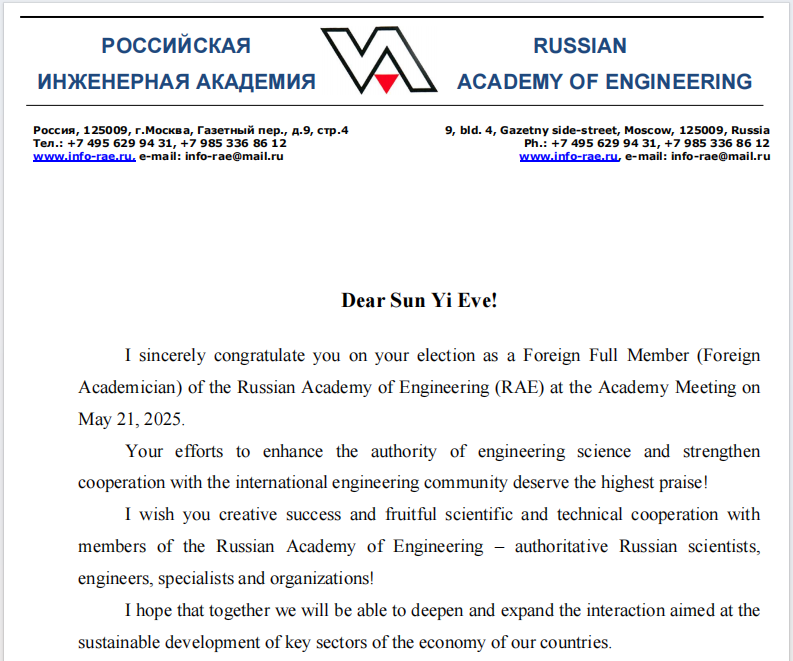Professor Yi Eve Sun was officially elected as a Foreign Full Member (Foreign Academician) of RAE
Recently, Professor Yi Eve Sun from the Faculty of Life and Health Sciences at Shenzhen University of Advanced Science and Technology (SUAT) was officially elected as a Foreign Full Member (Foreign Academician) of the Russian Academy of Engineering (RAE). She received a formal letter of congratulations from RAE President B.V. Gusev, recognizing her outstanding contributions to the field of stem cell and regenerative medicine. This prestigious honor further affirms Professor Sun’s global influence at the intersection of engineering technology and life sciences.

Professor Yi Eve Sun is an internationally renowned expert in stem cell and regenerative medicine. She currently serves as Chair Professor at the Faculty of Life and Health Sciences at SUAT, and is a National High-Level Talent Program awardee and a Fellow of the European Academy of Natural Sciences. She is also Executive Director of the National Center for International Collaboration in Stem Cell and Regenerative Medicine, and Deputy Director of the NMPA Key Laboratory for Viral Vector Technologies in Cell and Gene Therapy. Her research has long focused on neural stem cells and neurodevelopmental disorders, including Rett syndrome. She was the first to establish a non-human primate model for Rett syndrome and revealed the role of the MECP2 gene in neural stem cells. She also discovered that CD133-positive quiescent ependymal stem cells have strong regenerative potential, and proposed a novel repair model involving "non-inflammatory neurotrophic environments activating endogenous stem cells to reconstruct neural circuits." In recent years, she has explored systemic interactions between the gut microbiome, peripheral immunity, and the central nervous system, leading to the new intervention concept of “modulating the brain via the periphery.” She has published nearly 140 papers in top-tier journals including Cell, Nature, and Science, with over 20,000 citations and an H-index of 68. Her accolades include the Alfred P. Sloan Research Fellowship, the Beckman Young Investigator Award, and the Shanghai Science and Technology Progress Award.
Founded in 1990, the Russian Academy of Engineering was established jointly by the Russian Academy of Sciences, Ministry of Industry, Ministry of Defense, and the Aerospace Agency. It originated from the former Soviet Academy of Engineering, and its first president was Nobel Laureate Alexander Prokhorov. Today, the Academy has around 1,690 members, including over 200 foreign academicians from more than 30 countries. Professor Sun’s election is not only a significant personal honor but also marks a milestone in our institution’s advancement in life and health sciences on the global stage.